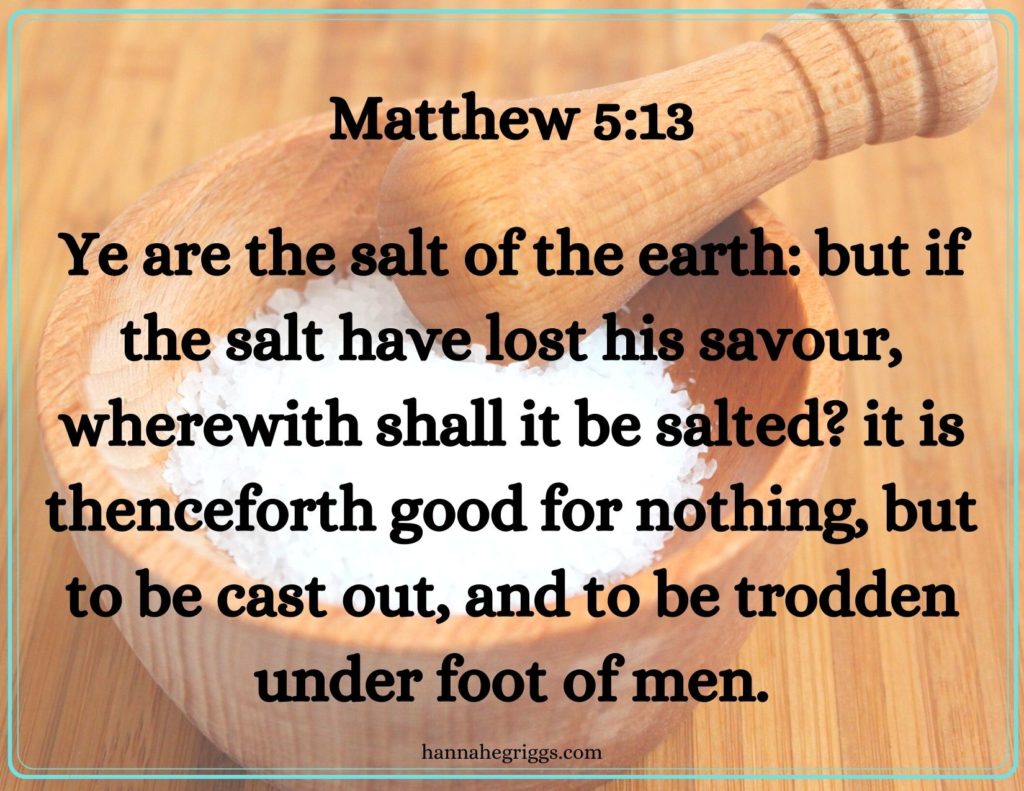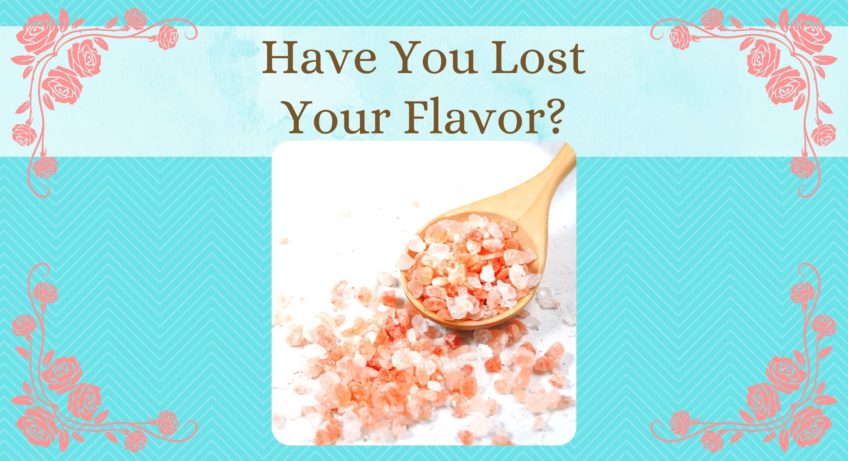Let me ask you a question? What kind of salt are you? Matthew 5:13 says, “Ye are the salt of the earth: but if the salt have lost his savour, wherewith shall it be salted? it is thenceforth good for nothing, but to be cast out, and to be trodden under foot of men.” Are you salt that still has saltiness, or have you lost all your flavor as a Christian?
Flavorful salt makes people thirsty. You’ve probably experienced this. You ate some salty potato chips or popcorn and then were really thirsty afterwards. You weren’t satisfied until you had a big glass of water, or maybe two glasses of water.
That is how we as Christians are to be to the unsaved people around us. Our lives are to be different and reflect Jesus living and working in us in such a way that it makes them thirsty for what we have.
We are to make the unsaved people thirsty for Jesus, the Water of Life, the only thing that can truly satisfy us. Like Jesus told the woman at the well in John 4:13-14, “Jesus answered and said unto her, Whosoever drinketh of this water shall thirst again: But whosoever drinketh of the water that I shall give him shall never thirst; but the water that I shall give him shall be in him a well of water springing up into everlasting life.”

A Study on Salt
A few months ago, I was doing a study on the Sermon on the Mount. As I studied Matthew 5:13, I read the notes on it from Barnes’ Commentary. It really helped me to better understand this verse. It explained about the kind of salt commonly found in the Middle East. This is the salt the people Jesus was speaking to would have been familiar with. So, I’m going to include an excerpt of his notes on this verse.
“Ye are the salt of the earth: but if the salt have lost his savour, wherewith shall it be salted? it is thenceforth good for nothing, but to be cast out, and to be trodden under foot of men.” Matthew 5:13
Flavorless Salt: Worse Than Useless
“That is, if it has become tasteless, or has lost its preserving properties. The salt used in this country is a chemical compound,and if the saltness were lost, or it were to lose its savor, there would be nothing remaining.
“In eastern countries, however, the salt used was impure, or mingled with vegetable or earthy substances, so that it might lose the whole of its saltness, and a considerable quantity of earthy matter remain. This was good for nothing, except that it was used to place in paths, or walks, as we use gravel.
“This kind of salt is common still in that country. It is found in the earth in veins or layers, and when exposed to the sun and rain, loses its saltness entirely. From the manner in which it is gathered, much earth and other impurities are necessarily collected with it. Not a little of it is so impure that it cannot be used at all, and such salt soon effloresces and turns to dust – not to fruitful soil, however.
“It is not only good for nothing itself, but it actually destroys all fertility wherever it is thrown; and this is the reason why it is cast into the street. There is no place about the house, yard, or garden where it can be tolerated. No man will allow it to be thrown on to his field, and the only place for it is the street, and there it is cast to be trodden underfoot of men.”
Are Our Lives Still Salty?
The salt that has lost its savor is worse than useless. It destroys fertile soil. Do Christians who have lost their saltiness have the same effect on the unsaved people around them? I believe so.
When a Christian’s life is not in agreement with God’s Word, when they are deliberately not living the kind of life God wants them to do, their witness will likely be worse than useless. Unsaved people are very quick to pick up on inconsistencies in a Christian’s life. So if the Christian’s words do not match the way they live, this will be a stumbling block.
Many unsaved people like to point out the inconsistencies in a Christian’s life as a reason why they do not want to become a Christian. While this is not a good excuse, we should still live in such a way that our lives reflect Christ. The fruits of the Holy Spirit should be seen in our lives, not the works of the flesh.
We should live in such a way that even before we share the Gospel with someone, they can tell that we are different. We should live in such a way that our lives back up what we say about how having Jesus in our hearts changes everything. When we are witnessing, our lives should not be a stumbling block to the words that we say.
Conclusion
Let me close with these questions. Based on our study of Matthew 5:13, what kind of salt have you been in the past? What kind of salt are you going to be from now on?



